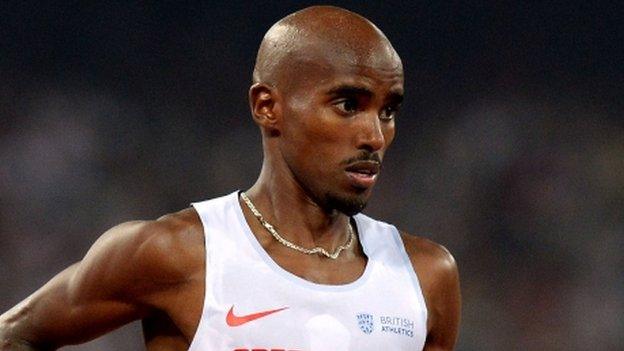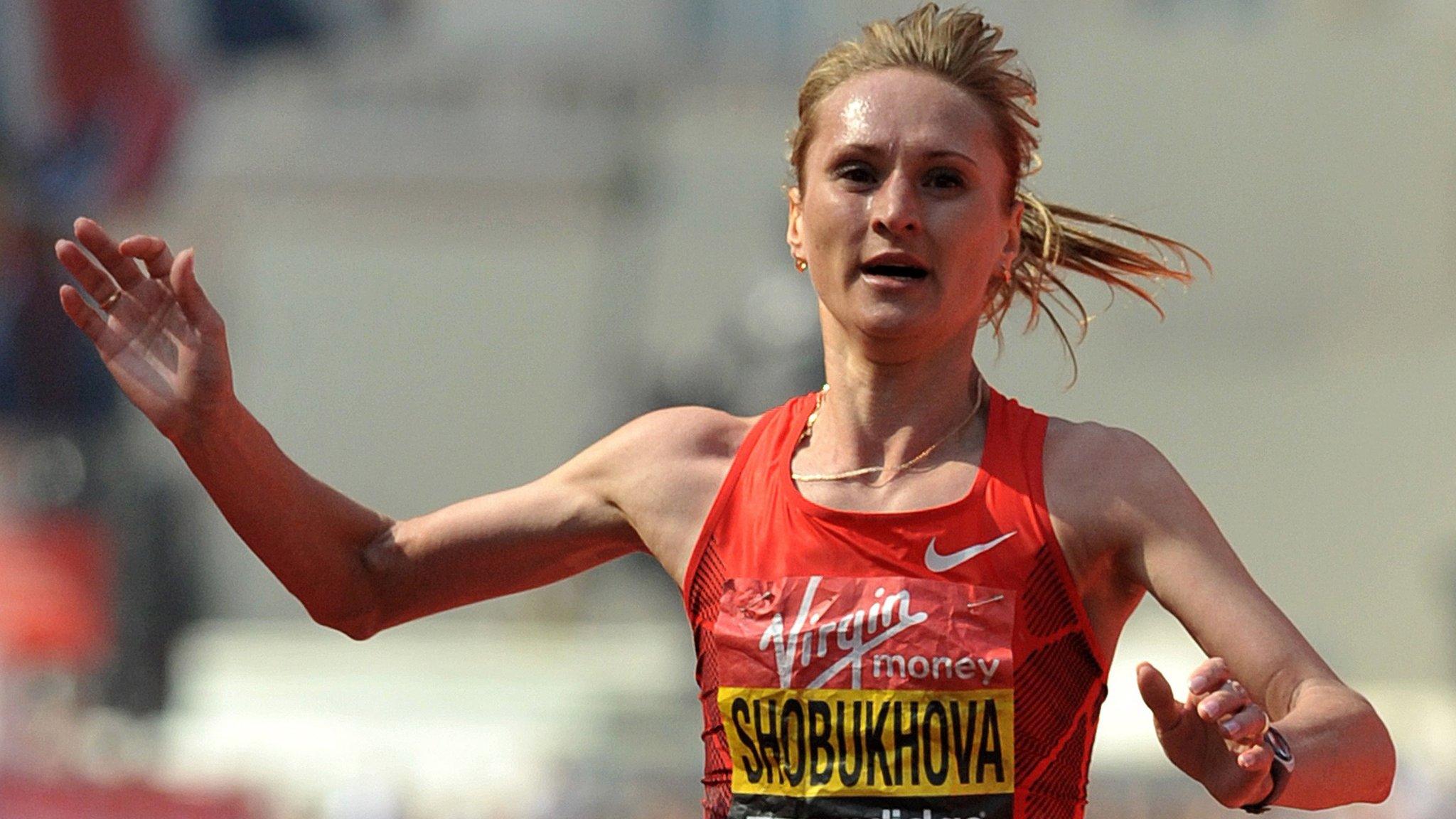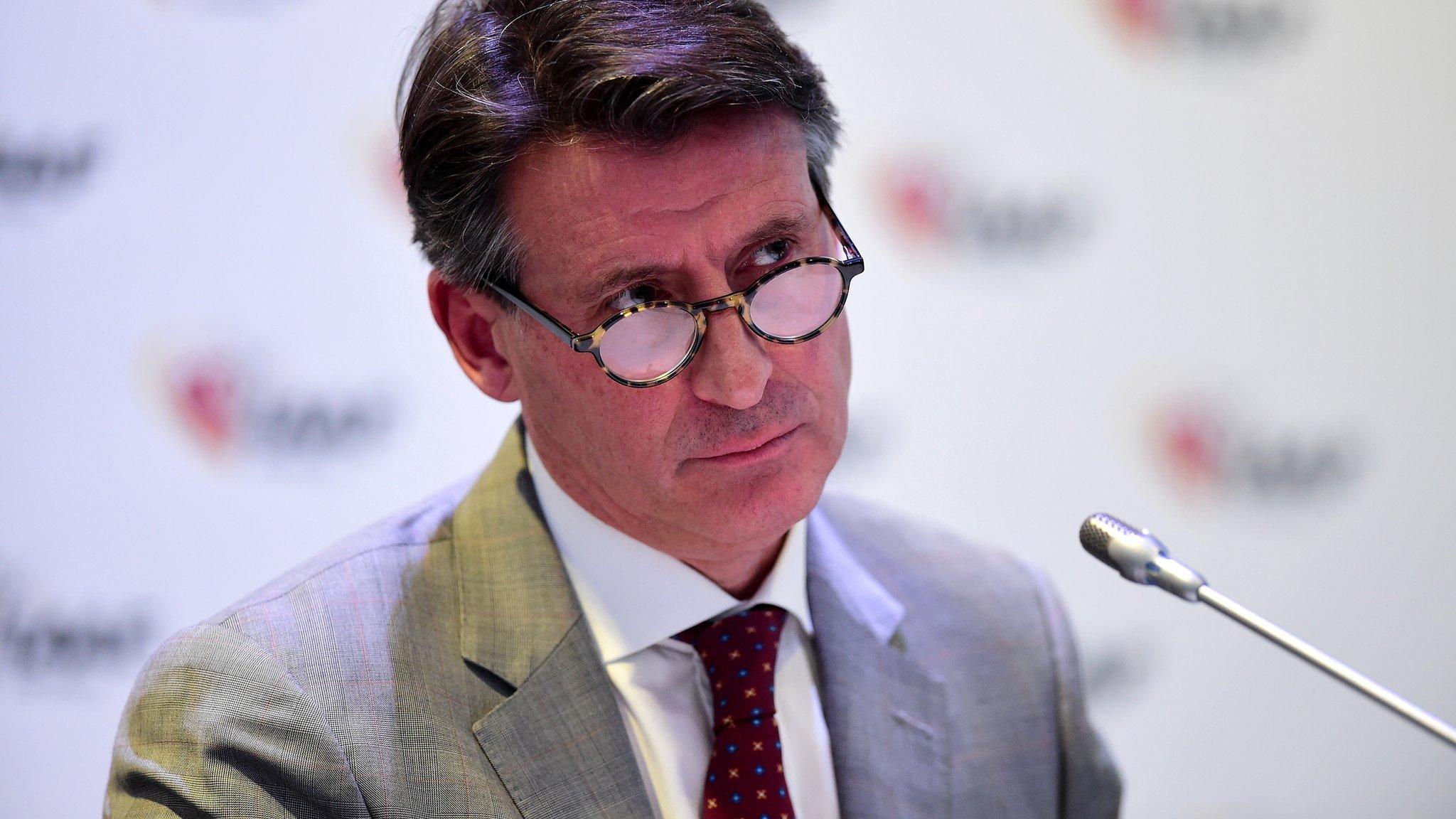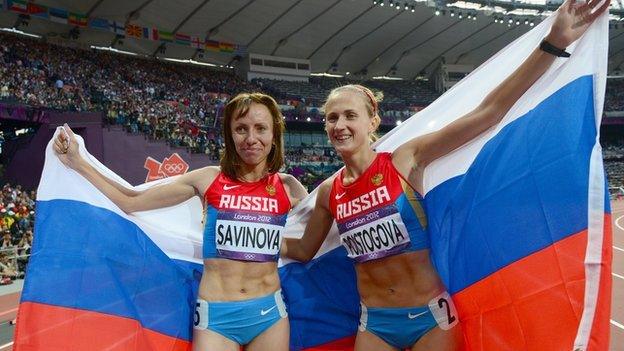Athletics doping crisis: UK Athletics wants to reset world records
- Published
Russia doping crisis in 60 seconds
UK Athletics has suggested world records should be reset to help achieve a "new era" of clean competition.
The sport's governing body has made 14 proposals, among them longer bans for drug cheats and a public register of tested athletes.
It follows a number of doping and cover-up allegations., external
UKA chairman Ed Warner said it was time for "radical reform", adding: "The integrity of athletics was challenged as never before in 2015."
The IAAF, which governs world athletics, said it welcomed UKA's contribution and would review its ideas.
Why is athletics in crisis?
The sport has been dogged by a string of damaging stories and revelations in recent months.
Russia was barred from international competition, external for alleged "state-sponsored doping".
Lamine Diack, the former boss of world governing body the International Association of Athletics Federations (IAAF), was placed under criminal investigation over allegations he took payments for deferring sanctions against Russian drugs cheats. He denies wrongdoing.
And three IAAF figures - including Diack's son, Papa Massata Diack - were given lifetime bans after a report claimed they "conspired" to blackmail a Russian athlete, external in order to cover up her doping violations.
New IAAF president Lord Coe has pledged to double the anti-doping budget, establish a separate integrity unit for athletics before Rio 2016, and double the international testing pool of athletes to 1,000.
What else does UKA suggest?
Warner says trust in the sport is at its "lowest point for decades", adding clean athletes and fans "have been let down".
"Greater transparency, tougher sanctions, longer bans - and even resetting the clock on world records for a new era - we should be open to do whatever it takes to restore credibility in the sport," he said.
Some of the key recommendations:
World Anti-Doping Agency (Wada) should maintain a public global register of all drugs tests
If not, UK Anti-Doping (Ukad) and UK sport should take the lead by forming a British register
The idea of a register of missed tests should also be investigated
Change the three strikes system so that missing three tests over a longer period of time - currently 18 months - can lead to a ban
Clean athletes to be compensated for loss of prize money by federations when drug cheats are banned and results annulled
The IAAF should look into drawing a line under all pre-existing world records and starting again
Minimum of eight-year bans for drug cheats so they miss two Olympic or Paralympic cycles, plus lifetime bans where appropriate
Criminalise supply or procurement of performance-enhancing drugs
Rename all anti-doping agencies under one umbrella. For example, Ukad would become Clean Sport UK
Why is UKA doing this?
Warner says it is all about provoking a discussion and defended the UKA's decision to go it alone.
"We've surprised people by revealing this because we want to promote debate," Warner told BBC Radio 5 live.
"If we go to people in advance, they try to talk you out of publishing the ideas. These are 14 ideas to stimulate discussion."
Warner points out that London is hosting the World Championships next year and wants athletics to take steps to clean up its act before then.
Losing faith in Coe?
Coe quizzed over his IAAF record
It may look that way to some, but Warner insists that is not the case.
"Of course I've got faith in him," he said.
"He is a great leader of the organisation, but he needs help and we are here to help him. This is one way we are trying to help."
He added that the IAAF was in a "beleaguered" state and said he would be meeting with Coe later on Monday to discuss the UKA's proposals.
In response to UKA's manifesto, the IAAF said it had already begun implementing its own proposals and would "look forward to reviewing" the UKA recommendations in full.
What about UKA and Salazar?
On Monday, UKA also published the recommendations of its review into the Oregon Project, run by Mo Farah's coach, Alberto Salazar.
The review was commissioned following allegations by BBC's Panorama that the coach had violated anti-doping rules.
UKA had already found that there was "no evidence of any impropriety" from Farah, Britain's multiple Olympic gold medallist, and no reason to "lack confidence" in his elite training programme.
But UKA has announced it will retain the Performance Oversight Committee (POC) as an independent watchdog of its practices.
Recommendations also include UKA carrying out due diligence whenever an athlete with British funding wishes to move to a foreign coach, or when UKA wants to have a working relationship with a coach or consultant.
Athletes in receipt of support from UKA should also be required to sign an agreement which outlines "moral and ethical" obligations.
And what about Wada?
It was a Wada independent commission report that threw the IAAF into crisis by disclosing "state-sponsored doping" in Russian athletics
On Thursday, part two of that damning report will be published.
At the time, Dick Pound, chairman of the independent commission, warned the public to expect further revelations.
Delayed to allow criminal investigations to progress, it is expected to focus on German TV documentary, external claims that the IAAF was allegedly complicit in covering up systematic doping and extortion in Russian athletics.
Analysis - Sports editor Dan Roan
"This is a radical set of proposals by UKA, which is desperate to see progress on anti-doping amid the worst crisis the sport has known.
"It believes the IAAF, run by Lord Coe, is too preoccupied with salvaging its own credibility after recent corruption allegations.
"With time running out to restore public trust before the 2017 World Championships in London, it has taken it upon itself to lead a debate.
"Greater investment, tougher sanctions and more transparency will be welcomed by many in the sport.
"However, Ukad was surprised that it was not consulted on the manifesto and only found out about it on Saturday.
"It may also decide to raise concerns over the lengthening of bans given it feels the current four-year sanction is proportionate.
"The idea of a 'clean era' of records is likely to be controversial, too."
- Published8 January 2016

- Published7 January 2016

- Published5 January 2016

- Published12 November 2015
